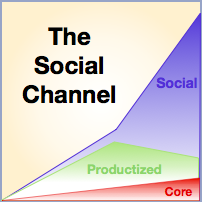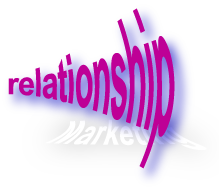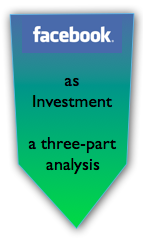Social Channel Three: Using the Social Channel to Defend Native Markets and Penetrate Foreign Markets
 The global Social Channel will reintroduce “home court advantage” to national brands because those that use social business to compete globally by collaborating with users will have the cultural advantage; “foreign” firms may have better product features for the money, but they will not match home brands’ cultural fluency. Personalized service and attention are culturally specific, and deep cultural fluency directly correlates to intimacy. However, brands can only develop the home court advantage by practicing social business at an advanced level. Most have a long way to go and, meanwhile, they will get hammered when they persist in competing on product features in the Productized Channel of Value. The global Social Channel will reintroduce “home court advantage” to national brands because those that use social business to compete globally by collaborating with users will have the cultural advantage; “foreign” firms may have better product features for the money, but they will not match home brands’ cultural fluency. Personalized service and attention are culturally specific, and deep cultural fluency directly correlates to intimacy. However, brands can only develop the home court advantage by practicing social business at an advanced level. Most have a long way to go and, meanwhile, they will get hammered when they persist in competing on product features in the Productized Channel of Value.
The blade cuts both ways: the home court advantage will make exporting to emerging markets much more difficult in the years ahead. The Social Channel will raise the bar because users in all markets will increasingly expect brands to relate to them and to solicit their input and advice. Brands will have to invest significantly in developing in-market social […]
How Marketers Are Pushing the Wrong Button on Mobile

Mobile advertising is flawed because it interrupts. CMOs’ continued use of such outmoded marketing tactics isn’t pretty, like bursting market bubbles or parties at which one has stayed too long. Screen-hogging banners or tricky apps are unnecessary for those who understand the mobile experience and how to add value; however, they are very effective for alienating clients and customers. As Stan Rapp puts it, “Don’t do things to people (do things with them).” In the interest of doing mobile right, I’ll juxtapose the mobile experience with advertising to show how inappropriate much of it is before suggesting how marketers and brands can add value and avoid destroying trust.
“Everybody hates digital ads.” This is a refrain I’ve heard forever, and I have never heard anyone say that they like them. People don’t even like big screen […]
Social Channel Two: Understanding the Social Channel of Value by Examining Its Precedents
 Meet the Social Channel of Value, the new arena where brands compete for user (customer, client) attention and loyalty. Product features are losing their ability to differentiate because they are copied so easily. Moreover, the Social Channel of Value will transform human decision-making, organizations and institutions because it digitizes sociality, a core human trait, and its power will dwarf the power of the product and the brand. CEOs, CMOs and CPOs have a very rare social business opportunity to harness the Social Channel ahead of competitors and remake their markets. These are strong statements, but bear with me and I think you’ll appreciate why I’ve made them. Meet the Social Channel of Value, the new arena where brands compete for user (customer, client) attention and loyalty. Product features are losing their ability to differentiate because they are copied so easily. Moreover, the Social Channel of Value will transform human decision-making, organizations and institutions because it digitizes sociality, a core human trait, and its power will dwarf the power of the product and the brand. CEOs, CMOs and CPOs have a very rare social business opportunity to harness the Social Channel ahead of competitors and remake their markets. These are strong statements, but bear with me and I think you’ll appreciate why I’ve made them.
The Social Channel is the Knowledge Economy‘s analog to the Industrial Economy’s assembly line, which led to today’s brands and mass-produced products. Where the assembly line made fabrication ten times more efficient, digital social technologies will boost human communication and sociality by an order of magnitude. The “Social Channel of Value” shows how product and service features will […]
Social Channel One: Building Post-Product Relationships with Customers is how to Build Brands
 Pioneering brands are building post-product customer relationships in the social channel because they realize that product features are copied easily and serve as weak differentiators, which leads to pervasive commoditization. Moreover, people’s preferences for individualized information dealt mass media a lethal blow, and products firms will have a similar fate. Here’s why products will become extinct and how to guide your brand in building post-product customer relationships and profits. Pioneering brands are building post-product customer relationships in the social channel because they realize that product features are copied easily and serve as weak differentiators, which leads to pervasive commoditization. Moreover, people’s preferences for individualized information dealt mass media a lethal blow, and products firms will have a similar fate. Here’s why products will become extinct and how to guide your brand in building post-product customer relationships and profits.
I have predicted for years that mass customization would be the fate of “products,” and social business is bearing this out in spades, so here I’ll delve into how impersonal “products” will be rejected by customers in 5-15 years. More important, CMOs and brand stewards who appreciate this transformation will enjoy unusual advantage, and smart ones will prepare for it now. Brands that don’t get it will simply perish, and no one will even notice except their producers and vendors. Just think about the local papers and TV stations you have known.
This is Part One […]
 Recent coverage has increased my doubts in Facebook’s management team, whose failure to capitalize on its unique assets looks increasingly likely. In the Facebook As Investment trilogy, I examined Facebook through three different lenses and voiced my doubts about its management team’s ability to realize the company’s fantastic potential. Many of CSRA’s clients have invested significantly in Facebook presences, and I am not predicting the site’s demise, but I question its long-term viability. Brands face two types of immediate risk: erratic technology/functionality changes to “add value” with features—and lack of innovation due to management team paralysis. Facebook Page owners and individual users may be inconvenienced, but nothing drastic will happen right away. As a related issue, Facebook’s experience may presage a Web 2.0 startup bubble bursting. After a summary of danger signs, I’ll recommend how you can minimize your inconvenience due to Facebook’s gyrations. Recent coverage has increased my doubts in Facebook’s management team, whose failure to capitalize on its unique assets looks increasingly likely. In the Facebook As Investment trilogy, I examined Facebook through three different lenses and voiced my doubts about its management team’s ability to realize the company’s fantastic potential. Many of CSRA’s clients have invested significantly in Facebook presences, and I am not predicting the site’s demise, but I question its long-term viability. Brands face two types of immediate risk: erratic technology/functionality changes to “add value” with features—and lack of innovation due to management team paralysis. Facebook Page owners and individual users may be inconvenienced, but nothing drastic will happen right away. As a related issue, Facebook’s experience may presage a Web 2.0 startup bubble bursting. After a summary of danger signs, I’ll recommend how you can minimize your inconvenience due to Facebook’s gyrations.
[…]
Nonprofits’ and NGOs’ use of street marketing and social media reveals how mission too often overshadows relationship building—and alienates more people than it attracts.
 In How Nonprofits & NGOs Can Press Their Home Court Advantage in Social Business, I explained how nonprofits had a significant “moral advantage” over commercial enterprises because they were cause-focused, which is inherently more attractive to most people than business focus. However, as I’ll explain here, too many NFPs apply their moral advantage in the wrong way, so it creates more negative than positive impressions. I’ll use the tangible example of street marketing to make the point before applying it to social business/social media. In How Nonprofits & NGOs Can Press Their Home Court Advantage in Social Business, I explained how nonprofits had a significant “moral advantage” over commercial enterprises because they were cause-focused, which is inherently more attractive to most people than business focus. However, as I’ll explain here, too many NFPs apply their moral advantage in the wrong way, so it creates more negative than positive impressions. I’ll use the tangible example of street marketing to make the point before applying it to social business/social media.
[…]
Upgrading the Expert Role for the Knowledge Economy shows how knowledge workers can no longer seek refuge in their core expertise, and how to branch out.

“Experts” are regarded as the foremost authorities in their fields, the glib guru versions notwithstanding. An oft quoted maxim shows why: according to Malcolm Gladwell, for one, it takes 10,000 hours [of study, work] for most people to become expert in something.* On a related front, Naveen Jain posits that experts will be less likely to solve today’s toughest problems because their expertise has become a box around them. All those degrees or promotions within the organization have focused their minds but also closed out creativity. While commenting on his post, I realized that redefining the expert would be necessary in the Knowledge Economy, so here I’ll offer some strategies and tactics for how to practice being an “expert” in the 21st century.
Notably, we can take lessons from experts and apply them to specialists, which are arguably less far along on the same vector—and more common.
[…]
 I have written often about various facets of social business disruption, which usually causes organizations angst because they have to learn to change how they do things. On a happier note, nonprofits and NGOs, long accustomed to being (relatively) disadvantaged do-gooders grateful for commercial bodies’ largesse, actually have more of an advantage in social business than commercial firms (“brands”). I have written often about various facets of social business disruption, which usually causes organizations angst because they have to learn to change how they do things. On a happier note, nonprofits and NGOs, long accustomed to being (relatively) disadvantaged do-gooders grateful for commercial bodies’ largesse, actually have more of an advantage in social business than commercial firms (“brands”).
In this context, government usually lies between nonprofits and brands because it’s not commercially focused (advantage), but it rarely considers individuals in meaningful ways (disadvantage). Here I’ll lay out the rationale for these claims before giving some practical pointers for unlocking social business potential by understanding the social good of your business. Brands and governments, you can learn from this, too.
[…]
How Brands Cut Their Exposure to Facebook Business Risk shows how brands can reduce the risks of depending on Facebook too much.

In the Facebook As Investment trilogy, I have analyzed several dimensions of investing in Facebook and raised my doubts about the company’s management and direction. In Part Three, I’ll address how brand executives can insulate themselves from Facebook’s—or any platform’s—fortunes by moving to make their relationships and networks portable. By making and managing investments carefully, brands’ relationships will endure regardless of platforms’ destinies.
By the way, Part One examined how Facebook’s trust gap would make it difficult for Facebook to fully monetize its considerable assets. Part Two analyzed Facebook as a social platform and revealed that it had no competitive threats from other pureplays; rather, the risk was that the whole pureplay category would lose its dominance in 3-5 years.
[…]
 My predictions from the 1990s and beyond about the disruption of “careers” and “work” have been coming true at an increasing pace, so here I’ll offer a quick retrospective of key trends as well as numerous how-to resources for using these disruptions to your advantage. Disruptions change the rules. Although most people don’t like “the rules” at times, we all take comfort in them because we have a clue about how to manage and get what we want. No one likes to feel clueless, but that’s how disruption causes most people to feel, so they try to avoid it. However, by facing the world head on and understanding the profound economic and social changes that are happening, you can see where the proverbial puck will be and skate there before most other people. Let’s go! My predictions from the 1990s and beyond about the disruption of “careers” and “work” have been coming true at an increasing pace, so here I’ll offer a quick retrospective of key trends as well as numerous how-to resources for using these disruptions to your advantage. Disruptions change the rules. Although most people don’t like “the rules” at times, we all take comfort in them because we have a clue about how to manage and get what we want. No one likes to feel clueless, but that’s how disruption causes most people to feel, so they try to avoid it. However, by facing the world head on and understanding the profound economic and social changes that are happening, you can see where the proverbial puck will be and skate there before most other people. Let’s go!
[…]
|
|
 The global Social Channel will reintroduce “home court advantage” to national brands because those that use social business to compete globally by collaborating with users will have the cultural advantage; “foreign” firms may have better product features for the money, but they will not match home brands’ cultural fluency. Personalized service and attention are culturally specific, and deep cultural fluency directly correlates to intimacy. However, brands can only develop the home court advantage by practicing social business at an advanced level. Most have a long way to go and, meanwhile, they will get hammered when they persist in competing on product features in the Productized Channel of Value.
The global Social Channel will reintroduce “home court advantage” to national brands because those that use social business to compete globally by collaborating with users will have the cultural advantage; “foreign” firms may have better product features for the money, but they will not match home brands’ cultural fluency. Personalized service and attention are culturally specific, and deep cultural fluency directly correlates to intimacy. However, brands can only develop the home court advantage by practicing social business at an advanced level. Most have a long way to go and, meanwhile, they will get hammered when they persist in competing on product features in the Productized Channel of Value.

 In How Nonprofits & NGOs Can Press Their Home Court Advantage in Social Business, I explained how nonprofits had a significant “moral advantage” over commercial enterprises because they were cause-focused, which is inherently more attractive to most people than business focus. However, as I’ll explain here, too many NFPs apply their moral advantage in the wrong way, so it creates more negative than positive impressions. I’ll use the tangible example of street marketing to make the point before applying it to social business/social media.
In How Nonprofits & NGOs Can Press Their Home Court Advantage in Social Business, I explained how nonprofits had a significant “moral advantage” over commercial enterprises because they were cause-focused, which is inherently more attractive to most people than business focus. However, as I’ll explain here, too many NFPs apply their moral advantage in the wrong way, so it creates more negative than positive impressions. I’ll use the tangible example of street marketing to make the point before applying it to social business/social media.
 I have written often about various facets of social business disruption, which usually causes organizations angst because they have to learn to change how they do things. On a happier note, nonprofits and NGOs, long accustomed to being (relatively) disadvantaged do-gooders grateful for commercial bodies’ largesse, actually have more of an advantage in social business than commercial firms (“brands”).
I have written often about various facets of social business disruption, which usually causes organizations angst because they have to learn to change how they do things. On a happier note, nonprofits and NGOs, long accustomed to being (relatively) disadvantaged do-gooders grateful for commercial bodies’ largesse, actually have more of an advantage in social business than commercial firms (“brands”).
 My predictions from the 1990s and beyond about the disruption of “careers” and “work” have been coming true at an increasing pace, so here I’ll offer a quick retrospective of key trends as well as numerous how-to resources for using these disruptions to your advantage. Disruptions change the rules. Although most people don’t like “the rules” at times, we all take comfort in them because we have a clue about how to manage and get what we want. No one likes to feel clueless, but that’s how disruption causes most people to feel, so they try to avoid it. However, by facing the world head on and understanding the profound economic and social changes that are happening, you can see where the proverbial puck will be and skate there before most other people. Let’s go!
My predictions from the 1990s and beyond about the disruption of “careers” and “work” have been coming true at an increasing pace, so here I’ll offer a quick retrospective of key trends as well as numerous how-to resources for using these disruptions to your advantage. Disruptions change the rules. Although most people don’t like “the rules” at times, we all take comfort in them because we have a clue about how to manage and get what we want. No one likes to feel clueless, but that’s how disruption causes most people to feel, so they try to avoid it. However, by facing the world head on and understanding the profound economic and social changes that are happening, you can see where the proverbial puck will be and skate there before most other people. Let’s go!